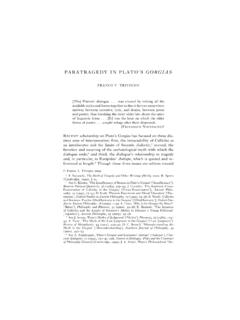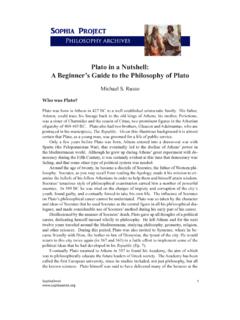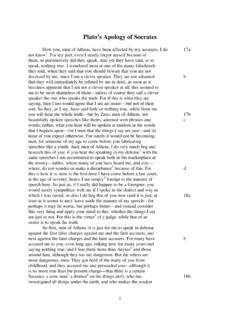Transcription of Gorgias By Plato - Free c lassic e-books
1 1 Gorgias By Plato 2 Gorgias By Plato 3 PERSONS OF THE DIALOGUE: Callicles, Socrates, Chaerephon, Gorgias , Polus. SCENE: The house of Callicles. CALLICLES: The wise man, as the proverb says, is late for a fray, but not for a feast. SOCRATES: And are we late for a feast? CALLICLES: Yes, and a delightful feast; for Gorgias has just been exhibiting to us many fine things. SOCRATES: It is not my fault, Callicles; our friend Chaerephon is to blame; for he would keep us loitering in the Agora. CHAEREPHON: Never mind, Socrates; the misfortune of which I have been the cause I will also repair; for Gorgias is a friend of mine, and I will make him give the exhibition again either now, or, if you prefer, at some other time. CALLICLES: What is the matter, Chaerephon--does Socrates want to hear Gorgias ? CHAEREPHON: Yes, that was our intention in coming. 4 CALLICLES: Come into my house, then; for Gorgias is staying with me, and he shall exhibit to you.
2 SOCRATES: Very good, Callicles; but will he answer our questions? for I want to hear from him what is the nature of his art, and what it is which he professes and teaches; he may, as you (Chaerephon) suggest, defer the exhibition to some other time. CALLICLES: There is nothing like asking him, Socrates; and indeed to answer questions is a part of his exhibition, for he was saying only just now, that any one in my house might put any question to him, and that he would answer. SOCRATES: How fortunate! will you ask him, Chaerephon--? CHAEREPHON: What shall I ask him? SOCRATES: Ask him who he is. CHAEREPHON: What do you mean? SOCRATES: I mean such a question as would elicit from him, if he had been a maker of shoes, the answer that he is a cobbler. Do you understand? 5 CHAEREPHON: I understand, and will ask him: Tell me, Gorgias , is our friend Callicles right in saying that you undertake to answer any questions which you are asked?
3 Gorgias : Quite right, Chaerephon: I was saying as much only just now; and I may add, that many years have elapsed since any one has asked me a new one. CHAEREPHON: Then you must be very ready, Gorgias . Gorgias : Of that, Chaerephon, you can make trial. POLUS: Yes, indeed, and if you like, Chaerephon, you may make trial of me too, for I think that Gorgias , who has been talking a long time, is tired. CHAEREPHON: And do you, Polus, think that you can answer better than Gorgias ? POLUS: What does that matter if I answer well enough for you? CHAEREPHON: Not at all:--and you shall answer if you like. POLUS: Ask:-- CHAEREPHON: My question is this: If Gorgias had the skill of his brother 6 Herodicus, what ought we to call him? Ought he not to have the name which is given to his brother? POLUS: Certainly. CHAEREPHON: Then we should be right in calling him a physician? POLUS: Yes. CHAEREPHON: And if he had the skill of Aristophon the son of Aglaophon, or of his brother Polygnotus, what ought we to call him?
4 POLUS: Clearly, a painter. CHAEREPHON: But now what shall we call him--what is the art in which he is skilled. POLUS: O Chaerephon, there are many arts among mankind which are experimental, and have their origin in experience, for experience makes the days of men to proceed according to art, and inexperience according to chance, and different persons in different ways are proficient in different arts, and the best persons in the best arts. And our friend Gorgias is one of the best, and the art in which he is a proficient is the noblest. SOCRATES: Polus has been taught how to make a capital speech, Gorgias ; 7 but he is not fulfilling the promise which he made to Chaerephon. Gorgias : What do you mean, Socrates? SOCRATES: I mean that he has not exactly answered the question which he was asked. Gorgias : Then why not ask him yourself? SOCRATES: But I would much rather ask you, if you are disposed to answer: for I see, from the few words which Polus has uttered, that he has attended more to the art which is called rhetoric than to dialectic.
5 POLUS: What makes you say so, Socrates? SOCRATES: Because, Polus, when Chaerephon asked you what was the art which Gorgias knows, you praised it as if you were answering some one who found fault with it, but you never said what the art was. POLUS: Why, did I not say that it was the noblest of arts? SOCRATES: Yes, indeed, but that was no answer to the question: nobody asked what was the quality, but what was the nature, of the art, and by what name we were to describe Gorgias . And I would still beg you briefly and clearly, as you answered Chaerephon when he asked you at first, to say what this art is, and what we ought to call Gorgias : Or rather, 8 Gorgias , let me turn to you, and ask the same question,--what are we to call you, and what is the art which you profess? Gorgias : Rhetoric, Socrates, is my art. SOCRATES: Then I am to call you a rhetorician? Gorgias : Yes, Socrates, and a good one too, if you would call me that which, in Homeric language, 'I boast myself to be.
6 ' SOCRATES: I should wish to do so. Gorgias : Then pray do. SOCRATES: And are we to say that you are able to make other men rhetoricians? Gorgias : Yes, that is exactly what I profess to make them, not only at Athens, but in all places. SOCRATES: And will you continue to ask and answer questions, Gorgias , as we are at present doing, and reserve for another occasion the longer mode of speech which Polus was attempting? Will you keep your promise, and answer shortly the questions which are asked of you? Gorgias : Some answers, Socrates, are of necessity longer; but I will do 9 my best to make them as short as possible; for a part of my profession is that I can be as short as any one. SOCRATES: That is what is wanted, Gorgias ; exhibit the shorter method now, and the longer one at some other time. Gorgias : Well, I will; and you will certainly say, that you never heard a man use fewer words. SOCRATES: Very good then; as you profess to be a rhetorician, and a maker of rhetoricians, let me ask you, with what is rhetoric concerned: I might ask with what is weaving concerned, and you would reply (would you not?)
7 , with the making of garments? Gorgias : Yes. SOCRATES: And music is concerned with the composition of melodies? Gorgias : It is. SOCRATES: By Here, Gorgias , I admire the surpassing brevity of your answers. Gorgias : Yes, Socrates, I do think myself good at that. SOCRATES: I am glad to hear it; answer me in like manner about rhetoric: 10 with what is rhetoric concerned? Gorgias : With discourse. SOCRATES: What sort of discourse, Gorgias ?--such discourse as would teach the sick under what treatment they might get well? Gorgias : No. SOCRATES: Then rhetoric does not treat of all kinds of discourse? Gorgias : Certainly not. SOCRATES: And yet rhetoric makes men able to speak? Gorgias : Yes. SOCRATES: And to understand that about which they speak? Gorgias : Of course. SOCRATES: But does not the art of medicine, which we were just now mentioning, also make men able to understand and speak about the sick? Gorgias : Certainly. 11 SOCRATES: Then medicine also treats of discourse?
8 Gorgias : Yes. SOCRATES: Of discourse concerning diseases? Gorgias : Just so. SOCRATES: And does not gymnastic also treat of discourse concerning the good or evil condition of the body? Gorgias : Very true. SOCRATES: And the same, Gorgias , is true of the other arts:--all of them treat of discourse concerning the subjects with which they severally have to do. Gorgias : Clearly. SOCRATES: Then why, if you call rhetoric the art which treats of discourse, and all the other arts treat of discourse, do you not call them arts of rhetoric? Gorgias : Because, Socrates, the knowledge of the other arts has only to do with some sort of external action, as of the hand; but there is no such action of the hand in rhetoric which works and takes effect only 12 through the medium of discourse. And therefore I am justified in saying that rhetoric treats of discourse. SOCRATES: I am not sure whether I entirely understand you, but I dare say I shall soon know better; please to answer me a question:--you would allow that there are arts?
9 Gorgias : Yes. SOCRATES: As to the arts generally, they are for the most part concerned with doing, and require little or no speaking; in painting, and statuary, and many other arts, the work may proceed in silence; and of such arts I suppose you would say that they do not come within the province of rhetoric. Gorgias : You perfectly conceive my meaning, Socrates. SOCRATES: But there are other arts which work wholly through the medium of language, and require either no action or very little, as, for example, the arts of arithmetic, of calculation, of geometry, and of playing draughts; in some of these speech is pretty nearly co-extensive with action, but in most of them the verbal element is greater--they depend wholly on words for their efficacy and power: and I take your meaning to be that rhetoric is an art of this latter sort? Gorgias : Exactly. 13 SOCRATES: And yet I do not believe that you really mean to call any of these arts rhetoric; although the precise expression which you used was, that rhetoric is an art which works and takes effect only through the medium of discourse; and an adversary who wished to be captious might say, 'And so, Gorgias , you call arithmetic rhetoric.
10 ' But I do not think that you really call arithmetic rhetoric any more than geometry would be so called by you. Gorgias : You are quite right, Socrates, in your apprehension of my meaning. SOCRATES: Well, then, let me now have the rest of my answer:--seeing that rhetoric is one of those arts which works mainly by the use of words, and there are other arts which also use words, tell me what is that quality in words with which rhetoric is concerned:--Suppose that a person asks me about some of the arts which I was mentioning just now; he might say, 'Socrates, what is arithmetic?' and I should reply to him, as you replied to me, that arithmetic is one of those arts which take effect through words. And then he would proceed to ask: 'Words about what?' and I should reply, Words about odd and even numbers, and how many there are of each. And if he asked again: 'What is the art of calculation?' I should say, That also is one of the arts which is concerned wholly with words.















